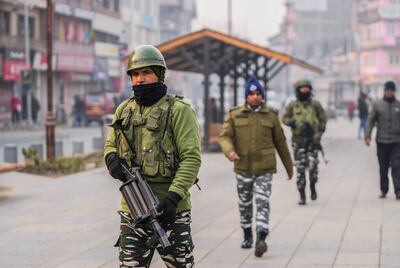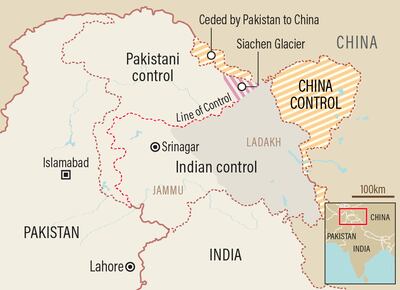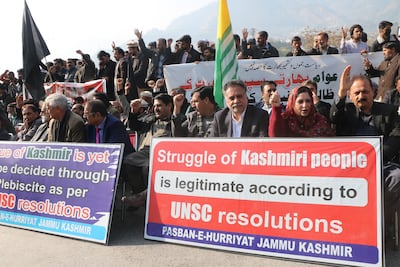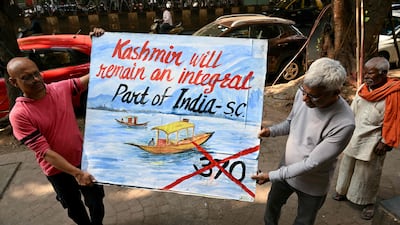India's Supreme Court verdict to uphold the repeal of Jammu and Kashmir's special status within India has been met with shock and disappointed by political parties in the Himalayan region.
India's top court gave legal approval for the Indian government's unilateral decision to strip Kashmir of the limited autonomy and special status it had held for decades in a decision announced by Chief Justice D Y Chandrachud on Monday.
It upheld the repeal of Article 370, which had barred non-residents from buying land or applying for jobs in the region and also provided local politicians limited autonomy in framing laws and regulations about internal affairs.
The five-judge court also approved the Indian government's 2019 decision to divide the princedom of Jammu and Kashmir into two federally administered territories: Jammu and Kashmir, and Ladakh.
The area has been contested since the partition of India in 1947, when the majority-Muslim princedom joined India after an invasion by armed tribesmen with limited backing by the Pakistani state.
India and Pakistan have since fought two of their three wars over the disputed territories on India’s heavily militarised northern frontier with Pakistan and China.
The move by the Supreme Court angered local politicians, who opposed the repeal of the region's special status, and authorities have increased the security presence in the region.
Farooq Abdullah, a three-time former chief minister of Jammu and Kashmir and the president of National Conference – the region’s main political party – reacted angrily outside the Indian parliament when he was asked about the decision.
“Let Jammu and Kashmir go to hell, that is where you have taken it,” he said.
“You want to win hearts of people, but how will you win hearts of people when you do things that push people away from you,” Mr Abdullah said, whose father Sheikh Mohammad Abdullah was one of the architects of the repealed law, named Article 370.

What is Article 370?
Article 370 of the Indian constitution, which provided autonomy for Jammu and Kashmir, was drafted in 1949 by several politicians including the state's prime minister at the time, Sheikh Mohammad Abdullah, and Gopalswami Ayyanger, who was a minister without portfolio in the first Indian Cabinet.
It was accepted by India's national parliament, and its first prime minister, Jawaharlal Nehru, who had publicly pledged in 1948 that the people of Kashmir should have a plebiscite to confirm their accession to India.
Classified only as a temporary provision, it was included in the Indian constitution in October 1949.
Article 370 granted Jammu and Kashmir autonomy over its internal affairs, and allowed it to make its own laws in all areas except defence, foreign affairs, finance and communications.
It also gave Jammu and Kashmir special status, which permitted it to have its own constitution and a separate flag.
A further provision known as Article 35A was added to the constitution in 1954 as part of Article 370. It empowered state legislators to ensure special rights and privileges for permanent residents of the state.
Article 35A was also scrapped with the repeal of Article 370, allowing non-Kashmiris to buy property in the region and ending local control over state government jobs and admission to colleges.

Reaction in Kashmir
There were no reports of protests in Indian-administered Kashmir, a picturesque Himalayan valley that has been the site of a deadly insurgency for the past three decades.
Security forces were on heightened alert and the movement of military convoys was halted on the day of the Supreme Court decision.
The article’s abrogation in August 2019, while Kashmir was placed under an unprecedented crackdown and communication blockade that lasted several months, has left political parties in the region confused about the future.
Zafar Choudhary, a political commentator and author, said no one had expected Article 370 to be abrogated even though past Indian prime ministers had repeatedly attempted to do so.
“The challenge to Article 370 was there since the 1950s, immediately after its inception … but no one believed till it happened in 2019. Now this [Supreme Court decision] was expected to be on these lines, but there was no imagination in between about what they [Kashmiri political parties] are going to do politically after that,” he said.
Mr Choudhary described the aftermath of the Supreme Court’s latest decision as “a very complicated situation”.
“There is no ground left now. There used to be a ground around which the people would revolve, now that ground is not there,” he said.
“What we have seen over last two days is very resounding. Whatever happened on August 5 [2019] is not as powerful as what happened on December 11. On August 5, a number of people in a number of ways understood what the reaction was going to be; is it going to be political, legal or some movement. There were a number of options, many things could have [happened], that time and after that,” he said.
“There is no idea what will be the response now. What we have seen for the last two days is that there is no response, people have been left speechless. They don’t understand [or] know how to respond to it,” he said.

'A death sentence for the idea of India'
Mehbooba Mufti, Kashmir's last elected chief minister who was detained in the aftermath of 2019 decision, described the Supreme Court’s decision as the “defeat of the idea of India”.
“It is nothing short of a death sentence for the idea of India,” she said in a video statement released on X, the platform formerly known as Twitter.
Adil Ahmad, a Srinagar resident who refused to give his last name, said it was a mistake to go to the Supreme Court over the government's repeal of Article 370.
“This has closed all doors for ever,” he said.
In north Kashmir’s Tilgam, a village famous for producing literary giants and poets, Fayaz Tilgami was initially reluctant to talk. He then carefully chose his words.
“This right should have been given to the people, to the [legislative] assembly. It should have been sanctioned by Kashmir’s assembly. That is a complaint of the people,” he said.
“Kashmir was a state within this country. If it [abrogation of the article] would have been sanctioned in the assembly, people would have had no complaint. Now people do have a shikwa [complaint],” said Tilgami, whose poems in the past talked about a sense of loss.
“People have a complaint that our assembly should have been allowed to sanction it first, which would have upheld our dignity,” he said.

